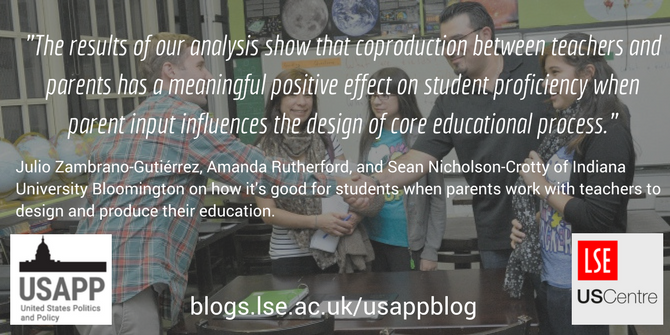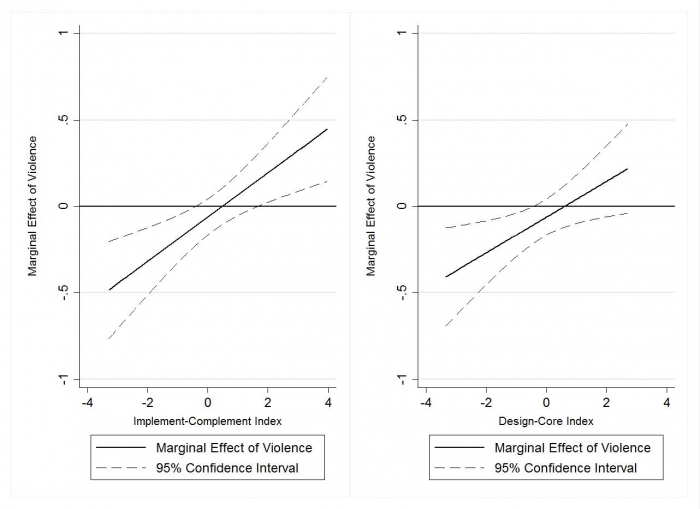

 The New York City Department of Education has long recognized the role of parent involvement in student academic achievement. Indeed, parents and teachers can work together to ‘coproduce’ educational services to benefit student achievement. However, we do not know what kind of coproduction directly and effectively supports educational attainment. In a new research, Julio Zambrano-Gutiérrez, Amanda Rutherford, and Sean Nicholson-Crotty look at the effects of different levels of access and influence parents have on educational tasks at public schools in the New York City School District. They find that when parents directly influence the design of educational services, both student achievement increases and the negative effects of school violence are reduced.
The New York City Department of Education has long recognized the role of parent involvement in student academic achievement. Indeed, parents and teachers can work together to ‘coproduce’ educational services to benefit student achievement. However, we do not know what kind of coproduction directly and effectively supports educational attainment. In a new research, Julio Zambrano-Gutiérrez, Amanda Rutherford, and Sean Nicholson-Crotty look at the effects of different levels of access and influence parents have on educational tasks at public schools in the New York City School District. They find that when parents directly influence the design of educational services, both student achievement increases and the negative effects of school violence are reduced.
When one parent speaks, schools listen; when one million parents speak, schools change. – Joel I. Klein, Chancellor of the New York City Department of Education, 2002-2010.
Teachers are often not the only responsible party for the education of children. They frequently interact with other educational stakeholders. In fact, teachers and parents working together to provide educational services – or ‘coproduction’ – is a necessary condition for improving student achievement. However, there are many ways in which parents and teachers can coproduce services that have different short-term effects on student performance and long-term ramifications for overall school climate and student college readiness. For example, parent feedback can influence the improvement of classroom instructional practices while teacher feedback can point parents to complimentary educational activities for their children. Looking at different types of coproduction and analyzing the effect of each type on student achievement is important for the long-term success of many school-aged children. Using standardized test scores as a primary indicator of student success, we suggest that different types of coproduced educational services have varied effects on students’ educational outcomes.
Coproduction is an active long-term relationship among public employees and users in the production of public services that users will either directly or indirectly consume. Evidence regarding whether coproduction improves organizational performance is unclear. We argue that a lack of distinguishing between distinct types of coproduction can explain the contradictory evidence regarding the effects of coproduction on organizational outcomes. Coproduction should be more beneficial for organizational outcomes when users are active in the design of tasks related to core organizational outcomes as compared to either passive engagement with an organization or active involvement related to peripheral goals.
Using data from 1,021 NYC public schools between 2007 and 2009, we identified different roles that parents play in their children’s schools and the effects of these types of coproduction on the average pass rate on Mathematics and English Language Arts standardized exams. Since 2007, The New York City Department of Education (NYCDE) has surveyed approximately 1.8 million parents, teachers, and students annually. The New York City (NYC) school survey aims to assess the learning environment at each school and measure the degree of parent involvement in the provision of educational services. We use these survey responses to identify multiple types of coproduction in educational services and link them to student educational outcomes to determine which forms of coproduction may be more effective.

“_D3N1119_fix_6x4_b” by Innovation_School is licensed under CC BY NC 2.0
More specifically, we used teachers’ insights about parent involvement in school to identify two types of coproduction: Design-Core and Implement-Complement. In the context of our study, Design-Core occurs when parents have access to designing instructional practices with teachers according to student learning needs. Implement-Complement happens when parents engage their children in complementary educational tasks after teachers share information with parents regarding students’ performance, learning expectations, and extra-curricular activities.
The results of our analysis show that coproduction between teachers and parents has a meaningful positive effect on student proficiency when parent input influences the design of core educational process. While we do not find a strong, direct linkage between Implement-Complement coproduction and student pass rates, it does not mean that such efforts are meaningless given that these efforts may have a more indirect influence on performance.
We also find that the benefits of coproduction are significantly larger for schools that operate in more violent environments. The New York State Education Department calculates a School Violence Index to monitor different violent incidents and to implement strategies to provide a safe environment for students. Figure 1 shows how the negative effect of violence on student pass rates is reduced and even eliminated across instances in which both types of coproduction increase in school. This means that organizations working in turbulent environments should consider particular types of coproduction strategies in which users have the opportunity to design and implement core organizational tasks. More broadly, policy-makers and practitioners should consider not only the type of organizational outcome that they want to improve but also which type of coproduction effort will be more effective in their policy context.
Figure 1 – Marginal effect of violence on average student pass rate as coproduction changes.

- This article is based on the paper, ‘Types of coproduction and differential effects on organizational performance: Evidence from the New York City school system’, in Public Administration.
Please read our comments policy before commenting.
Note: This article gives the views of the author, and not the position of USAPP – American Politics and Policy, nor of the London School of Economics.
Shortened URL for this post: http://bit.ly/2zIMQlg
_________________________________
About the authors
 Julio C. Zambrano-Gutiérrez – Indiana University Bloomington
Julio C. Zambrano-Gutiérrez – Indiana University Bloomington
Julio C. Zambrano-Gutiérrez is a PhD student in the the School of Public and Environmental Affairs at Indiana University Bloomington.
 Amanda Rutherford – Indiana University Bloomington
Amanda Rutherford – Indiana University Bloomington
Amanda Rutherford is an Assistant Professor in the School of Public and Environmental Affairs at Indiana University Bloomington.
 Sean Nicholson-Crotty – Indiana University Bloomington
Sean Nicholson-Crotty – Indiana University Bloomington
Sean Nicholson-Crotty is a Professor in the School of Public and Environmental Affairs at Indiana University Bloomington.



